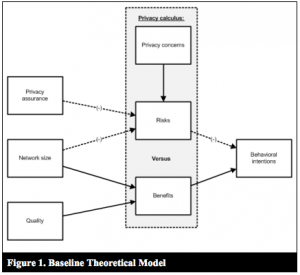Network Effects & Information Cascades in the Purchase of Location-Based Mobile Apps
One recent research study that draws from principles discussed in our course is the 2011 multi-author paper, “The Roles of Privacy Assurance, Network Effects, and Information Cascades in the Adoption of and Willingness to Pay for Location-Based Services with Mobile Applications.” Given the rise of smartphone technology in the past decade, there has been an explosion of mobile applications, or “apps” for short, that have enhanced the lives of consumers in just about every realm of life. About one third of the 350,000 apps on the Apple platform and 90,000 apps on the Android platform utilize location-based services (LBS), GPS-based software that is implemented in IMT-2000/3G devices and requires user location to become useful. This poses a privacy risk for users who must determine whether or not the perceived benefit of the app is worth the potential consequences of their data falling into the wrong hands. Of the location data currently collected by LBS apps, most is harmlessly sold to advertisers, but there is increasing concern among consumers that malware might grant access to criminals. In the absence of more robust government regulation to mitigate this risk, users are forced to decide between enjoying the utility of apps and preserving location privacy.
The paper explores the manner in which network effects and information cascades impact users’ behavior in choosing to purchase LBS apps amidst location-related privacy risk. In order to quantify these forces, the authors conducted a 3x2x2 factorial experiment in which they recorded the decisions of 1588 college students choosing whether or not to purchase each of four Apple iPhone apps: a traffic updater, a fitness route mapper, a friend finder, and a sex offender tracker. These apps were presented to each subject with a random assignment from three possible privacy assurance ratings (none, low, or high), two quality indicators (low or high), and two network sizes (small or large). With each subject choosing to purchase or decline each of the four apps, the researchers hoped to determine the factors that influence the users’ tradeoff between the perceived risks of surrendering personal location data and deriving benefit from an app. Presented below is this “privacy calculus” decision-making process on the part of the consumer:
The results of this experiment corroborate two of the major concepts that we have covered in class recently. First, the researchers found a direct relationship between the size of an app’s network and its perceived utility. This is because most users who purchase LBS apps do so to reap direct benefits of interacting with as many other individuals as possible through the app, such as by sharing fitness routes and viewing friend’s daily movements for example. There are also indirect benefits to using an LBS app with a large network base because the information supplied by that app, perhaps regarding traffic congestion or restaurant quality, will likely be more accurate if more users input their thoughts. The tendency for a large network to draw further purchases holds even when quality indicators are sub-par. Second, it was found that information cascade effects often trigger users to purchase LBS apps with poor privacy assurance ratings for a sufficient network size. It is possible that a popular LBS app has serious privacy vulnerabilities and that all users purchased it only because the others gave their empty votes of confidence. In essence, LBS app users feel safety in numbers regardless of the actual privacy assurance levels. The presence of these network effects and information cascades in users’ purchasing of LBS apps thus must be considered by government regulators when constructing privacy assurance standards for mobile apps.
While the research findings discussed above might vary among different cultural or age groups, the observed trends demonstrate an interesting application of network theory. Privacy will continue to pose a primary concern to LBS adoption that will force mobile app developers to seek out new ways of ensuring location data protection. In the meantime, mobile app users should be cognizant of the network effects and information cascades that influence consumer behavior and might skew perceived utility and privacy risk. I enjoyed learning about this real-world example of ECON 2040’s principles in action and I recognize the important role that our course’s subject matter can play in explaining complex phenomena.
Reference:
Mark Jeffrey Keith, Jeffry S. Babb Jr., Paul Benjamin Lowry, Christopher Paul Furner, and Amjad Abdullat (2011). “The Roles of Privacy Assurance, Network Effects, and Information Cascades in the Adoption of and Willingness to Pay for Location-Based Services with Mobile Applications.” Proceedings of the Dewald Roode Workshop in Information Systems Security 2011, Blacksburg, Virginia, USA, September 22–23.
http://papers.ssrn.com/sol3/papers.cfm?abstract_id=2287446

